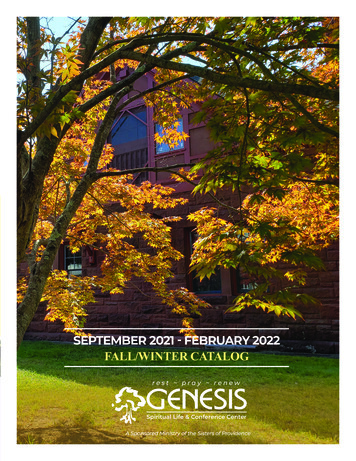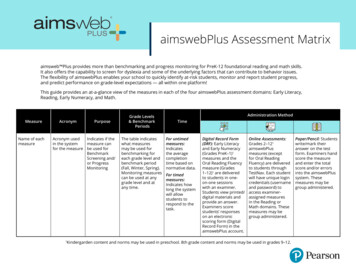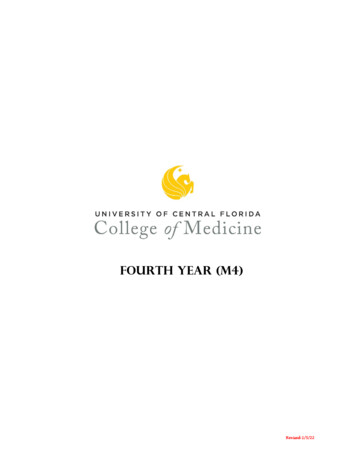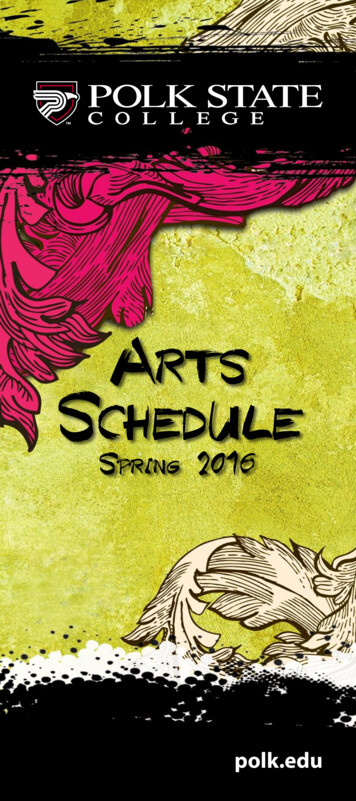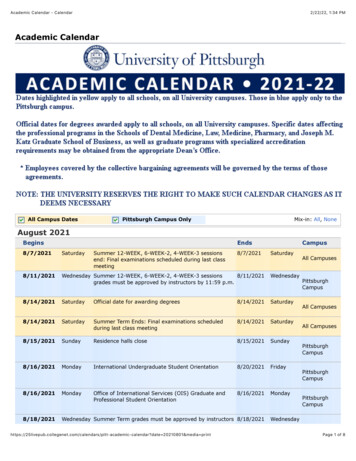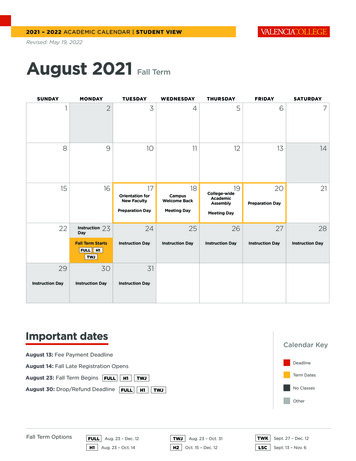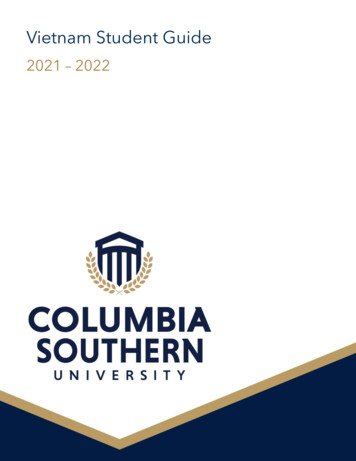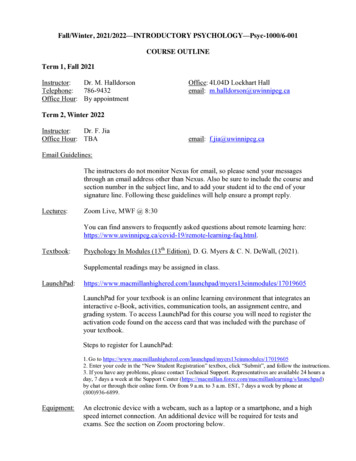
Transcription
Fall/Winter, 2021/2022—INTRODUCTORY PSYCHOLOGY—Psyc-1000/6-001COURSE OUTLINETerm 1, Fall 2021Instructor:Dr. M. HalldorsonTelephone:786-9432Office Hour: By appointmentOffice: 4L04D Lockhart Hallemail: m.halldorson@uwinnipeg.caTerm 2, Winter 2022Instructor:Dr. F. JiaOffice Hour: TBAemail: f.jia@uwinnipeg.caEmail Guidelines:The instructors do not monitor Nexus for email, so please send your messagesthrough an email address other than Nexus. Also be sure to include the course andsection number in the subject line, and to add your student id to the end of yoursignature line. Following these guidelines will help ensure a prompt reply.Lectures:Zoom Live, MWF @ 8:30You can find answers to frequently asked questions about remote learning ning-faq.html.Textbook:Psychology In Modules (13th Edition). D. G. Myers & C. N. DeWall, (2021).Supplemental readings may be assigned in launchpad/myers13einmodules/17019605LaunchPad for your textbook is an online learning environment that integrates aninteractive e-Book, activities, communication tools, an assignment centre, andgrading system. To access LaunchPad for this course you will need to register theactivation code found on the access card that was included with the purchase ofyour textbook.Steps to register for LaunchPad:1. Go to 3einmodules/170196052. Enter your code in the “New Student Registration” textbox, click “Submit”, and follow the instructions.3. If you have any problems, please contact Technical Support. Representatives are available 24 hours aday, 7 days a week at the Support Center aunchpad)by chat or through their online form. Or from 9 a.m. to 3 a.m. EST, 7 days a week by phone at(800)936-6899.Equipment:An electronic device with a webcam, such as a laptop or a smartphone, and a highspeed internet connection. An additional device will be required for tests andexams. See the section on Zoom proctoring below.
Website:https://nexus.uwinnipeg.caSubject Pool: Karen BarkhouseTelephone:786-9744Office: 4L41A Lockhart Hallemail: k.barkhouse@uwinnipeg.caCalendar Description:This course provides an introduction to the scientific analysis of behaviour and mental activityfrom the biological, social, and individual perspectives. Major topics include the following:perception, motivation, learning, memory, intelligence, personality, states of consciousness,social interaction, developmental processes, hereditary and environmental influences, abnormalpsychology, therapeutic methods, and procedures for collecting and summarizing data. Studentsare expected to participate directly or indirectly in the Department's ongoing research program.This course is prerequisite for all other Psychology courses.Mechanics of the Course:The topics in this course will be taught primarily through lectures; however, the normal activitiesof the class will not be limited to lectures. Demonstrations, videos, and short exercises will alsobe used to supplement the topics discussed in class. Students are responsible for all materialpresented in lectures, as well as material in assigned readings, even if not covered in lectures.Students are also responsible for all missed material. Arrangements to obtain any missed materialmust be made with other students in the class, not the instructor or TA.A. Tests – Each term there will be two term tests. Term tests are non-cumulative and will coverall class activities (e.g., lectures, videos, etc.) and assigned readings since the preceding termtest. Tests will be given during a regular class meeting and consist of approximately 60multiple-choice questions.Value: 4 x 10% 40%B. Exams – Each term there will also be a term exam. Term exams are cumulative and willcover all material presented in the immediately preceding term. More questions, however,will be asked about topics from the final chapters that are not included in either term test.Exams are scheduled for the corresponding Fall/Winter Term evaluation period and willconsist of approximately 120 multiple-choice questions.Value: 2 x 25% 50%C. Test and Exam DatesFall TermWinter TermTest #1 – Friday, October 8, 2021Test #2 – Monday, November 15, 2021Test #3 – Friday, February 4, 2022Test #4 – Friday, March 11, 2022Fall Exam – TBAWinter Exam – TBA
D. Test and Exam Policies – For all tests and exams, students will have use of a calculator, andwhere English is not your first language, you may be permitted to bring a translation-onlydictionary (i.e., with no word definitions). You must submit your translation-only dictionaryto me for approval before the test date. Please bring Photo-ID to all tests and exams.Tests and exams are closed-book assessments. As such, with the exception noted above, youare prohibited from consulting your textbook, notes, or any other outside sources, includingother people or the internet, when writing a test or exam. I will ask you to complete anacademic integrity declaration before each test or exam. Failure to complete the declarationwill result in a grade of zero on the assessment.E. Notice Regarding Remote Test and Exam Proctoring – Tests/exams are proctored through alive Zoom meeting and may also be recorded locally for later review. Proctors will bemonitoring for any evidence of academic dishonesty. Each proctor will monitor a small groupof students simultaneously. Students must sit and face an engaged camera to enablemonitoring. Microphones can be muted. After being reviewed for academic dishonesty, anyrecordings made will be promptly deleted if no such evidence is found.As part of this monitoring, please note:Each student’s name and everything within their camera’s view, including their face,body and background, will be visible to the proctor and to the other students withinthe group.If a student uses the chat feature, anything written will be visible to all meetingparticipants.If a student chooses to un-mute their microphone, anything said will be heard by allmeeting participants.Zoom has been configured to disable students from recording the test/exam. Informationregarding Zoom’s data collection, including a link to its privacy policy, can be foundat ce.html. Student personalinformation is collected under the University of Winnipeg Act and 36(1)(b) of the Freedomof Information and Protection of Privacy Act. For information regarding privacy atUWinnipeg, contact Dan Elves, Senior Information and Privacy Officer,at da.elves@uwinnipeg.ca or 204.988.7538F. Make-ups – Students will be allowed to write a make-up test if absent with good reasonon a test date. Absences from tests will be excused for reasons relating to sickness, deathin the family, or religious holidays. Make-ups will be given full value upon receipt of anadequate letter from a physician, member of the clergy, or undertaker, whatever thecase may be. For any other reason, make-ups will be given but with 10 percentagepoints automatically dropped from the earned number of percentage points. If a test isnot made up, you will automatically receive the equivalent of 25% correct which is theexpected value under conditions of pure guessing. Such a mark is referred to as a“default”. All make-ups, whether at full value or with penalty, are to be written withinseven days of the original test date, because there is a delay penalty of 10 percentagepoints per week thereafter from the earned number of percentage points. Requests forwriting a make-up of any type are to be made in the form of a letter and contain thereason for missing the test and all relevant dates. Note that if a make-up appointment ismissed, you will be assigned a default value of 25% correct.
G. LearningCurve Activities – LaunchPad includes an adaptive quizzing engine calledLearningCurve. LearningCurve facilitates your retention and understanding of coursematerial through an approach known as “testing-to-learn”. To help you take full advantage ofthis learning approach, I will assign LearningCurve activities for each of the assignedreadings in the textbook, and I will allow you to earn up to 10% (5% each term) of your finalgrade for completing these activities. Each LearningCurve activity you complete will earnyou 1 point (Sorry, I will not award partial points.), and you will be able to earn a maximumtotal of 20 points each term. I will then determine your grade for LearningCurve activities bycalculating the percentage of LearningCurve activities you complete out of a combinedmaximum total of 40 points across both terms. For example, if a student completes 12activities out of the maximum total of 20 in the first term, and 18 activities out of themaximum total in the second term, then the student would receive a grade of 75% forLearningCurve activities [i.e., (12 18) / (20 20) 30/40 x 100 75%]. Note that I willassign more than the maximum total of 20 LearningCurve activities in each term. This meansthat you can miss up to 10 Learning Curve activities over the duration of the course and stillearn a 100% for these activities.The “Upcoming Assignments” section on the LaunchPad Welcome screen as well as thecourse home page lists the assigned LearningCurve activities and their due dates. You areresponsible for completing the LearningCurve activities before they are due. This policy willhelp to insure that your work on the course material is both timely and beneficial. Note thatLearningCurve assignments will disappear from LaunchPad after their due dates, and oncethey are gone, they will NOT be made available to you again.Do not wait until the last minute to complete LearningCurve assignments.Value: 2 x 5% 10%H. Research Requirement – Pass or Fail (A failure results in a lowered final grade).Grading Procedure:The maximum number of points possible for this course is 100. A numerical score out of 100 will bedetermined for each student by totalling the points he or she has earned on the tests and exams. Thenumerical score determined in this way will be converted to a letter grade according to the followingscale: [The cut-offs are tentative and subject to change in either direction by (i) the courseinstructor, (ii) the Departmental Review Committee, or (iii) the Senate.]The translation from marks to letter grades in this course is as follows.A 86 and overA- 80 - 85B 75 - 79B 70 - 74A at instructor’s discretionC 65 - 69C 60 - 64D 50 - 59F 0 - 49
Example of Grade Determination:The following table illustrates the grade calculations.ComponentTest #1Test #2Fall ExamTest #3Test #4Winter ExamLearning %70%68%72%78%75%Mark X Weight/1007.26.817.56.87.219.57.572.5 73 MarkThe student in this example would receive a letter grade of B.The Voluntary Withdrawal (W) date for this course is Wednesday, February 16, 2022. Note thatwithdrawing before the VW date does not result in a fee e-drop-information.html. Please read the appropriateitems in Section VII of the General Calendar dealing with Senate regulations on withdrawal dates,appeals, plagiarism, cheating, and academic docs/regulationsandpolicies.pdf.Services for Students with Disabilities:Students with documented disabilities, temporary or chronic medical conditions requiring academicaccommodations for tests/exams (e.g., private space) or during lectures/laboratories (e.g., access tovolunteer note-takers) are encouraged to contact Accessibility Services (AS) at 786-9771 or emailaccessibilityservices@uwinnipeg.ca to discuss appropriate options. Specific information about AS isavailable on-line at http://www.uwinnipeg.ca/accessibility. All information about a student’sdisability or medical condition remains confidentialUniversity Policies:We ask that you please be respectful of the needs of classmates and instructors/professors byavoiding the use of unnecessary scented products while attending lectures. Exposure to scentedproducts can trigger serious health reactions in persons with asthma, allergies, migraines or chemicalsensitivities. Please consider using unscented necessary products and avoiding unnecessary productsthat are scented (e.g. perfume).Students who plan to conduct research interviews, focus groups, surveys, or any other method ofcollecting data from any person, even a family member, must obtain the approval of the appropriateethics committee before commencing data collection. Exceptions are research activities in class as alearning exercise. See http://www.uwinnipeg.ca/research/human-ethics.html for submissionrequirements and deadlines.All students, faculty and staff have the right to participate, learn and work in an environment that isfree of harassment and discrimination. The UW Respectful Working and Learning EnvironmentPolicy may be found online at http://www.uwinnipeg.ca/respect.
Students may choose not to attend classes or write examinations on holy days of their religion, butthey must notify their instructors at least two weeks in advance. Instructors will then provideopportunity for students to make-up work and/or examinations without penalty. A list of religiousholidays can be found at: ant-notes.pdfStudents facing a charge of academic or non-academic misconduct may choose to contact theUniversity of Winnipeg Students’ Association (UWSA) where a student advocate will be availableto answer any questions about the process, help with building a case, and ensuring students haveaccess to support. For more information or to schedule an appointment, visit their website atwww.theuwsa.ca/academic-advocacy or call 204-786-9780.
Tentative Course TimetableTerm 1, Fall 2021WedFriMonMonWeek ofTopicReadingsSept 08First Lecture, Term 1Introduction1SeptSeptSeptOct16202704History and PerspectivesCritical ThinkingBiology of MindBiology of Mind2,34,56Oct08Test #1 (10%)1 – 6Oct11Fall Term Reading Week.No Classes, Oct 11 - 15.Oct18Nature-Nurture10,11OctNovNov250108Human Diversity and SensationSensation and PerceptionStates of Consciousness17,1819,78,9Nov15Test #2 (10%)Nov15Human Development7 – 11,17 – 1913,14NovNovDec222906Human DevelopmentSocial PsychologySocial Psychology15,1640,4141,43Dec06Last Lecture, Term 1Exam #1 (25%), TBA.1 – 11,13 – 19,40 - 43The course timetable is only a guide to topics, as some topics may beadded or deleted as time dictates.Timetable continues on the next page . . .
Tentative Course TimetableTerm 2, Winter 2022FriFriFriWedWeek ofTopicReadingsJanFirst Lecture, Term ng and MemoryMemory and IntelligenceIntelligence22,2324,2528,2929Feb04Test #3 (10%)20 - 25,28 – 29Feb07Motivation (Theory)31, 32Feb14Motivation (Hunger and Sex)33,34Feb21Winter Reading Week.No Classes, Feb 21 – 25.35,FebFebMar212807Motivation (Achievement) and EmotionEmotion and StressStress36,3737,3838Mar11Test #4 (10%)31 – yPersonality and Psychological DisordersPsychological Disorders and TherapyTherapy45,4647,4849,5053,54,55Apr06Last Lecture, Term 2Exam #2 (25%), TBA2028314453––-25,29,38,50,55The course timetable is only a guide to topics, as some topics may beadded or deleted as time dictates.Timetable continues on the next page . . .
Important Dates:Term 1, Fall: The first day of class is September 8, 2021. Last classwill be held on December 6, 2021. There are no make-up classes in theFall Term. Evaluation period is December 9 – 22, 2021.Term 2, Winter: The first day of class is January 7, 2022. Last classwill be held on April 6, 2022. There are no make-up classes in theWinter Term. Evaluation period is April 8 – 22, 2022.The University is closed for holidays and there are no classes on thefollowing dates:September 6, 2021 (Labour Day)September 30, 2021 (National Day of Truth and Reconciliation Day)October 11, 2021 (Thanksgiving)November 11, 2021 (Remembrance Day)December 23, 2021 — January 4, 2022 (December Break)February 21, 2022 (Louis Riel Day)April 15, 2022 (Good Friday)
Fall-Winter 2021-2022, INTRODUCTORY PSYCHOLOGY RESEARCH REQUIREMENTPsychology is a data-driven discipline. To become better acquainted about how data is gathered and interpreted,all introductory psychology students are required to participate in research studies and/or review Psychologyresearch articles. This assignment will give you a deeper experiential understanding of the course and thescientific research process, and your time and effort will be greatly appreciated by the 30 or so Psychologyhonours students who must complete a research thesis to graduate. We want your participation to be aninteresting learning experience and are interested in your feedback. Concerns and questions about thisrequirement can always be directed to the coordinator, Karen Barkhouse, Office 4L41A, 786-9744,k.barkhouse@uwinnipeg.ca. (Not your professor.)In brief, you must earn at least 6.0 research credits by Monday, April 18, 2022. (3.0 credits for the evening PSYC1000-050, due by Monday December 13th, 2021). Your credits and study sign ups are recorded in an online programcalled SONA. You’ll receive access to SONA via an email sent in September (January for section 012). Youshould see in your Nexus profile a course called PSYC1000 Introductory Psychology Research Requirement(Instructor is K. Barkhouse) and there you will find everything you need to know about this assignment, a linkto SONA, and access to the journal articles if you need them. Note: You can access SONA via the link in Nexusor browse direct to SONA website. SONA’s FAQ (frequently asked questions) addresses several commonquestions.WAYS TO OBTAIN CREDITS1. Actively participate in either an online or on-campus research study: You’ll view a list of studies posted inSONA and sign–up for a time slot (not during your PSYC 1000 class time). Carefully read the studydescription and requirements, and note any pre-requisites and eligibility requirements (e.g., only red-headedmales owning pet turtles). Studies have variable credit values. For example, studies taking 30 minutes orless are worth 0.5 of a credit and those between 30 and 60 minutes are worth 1.0. Some longer or two-partstudies are worth more than 1.0 credit. For on-campus studies, extra credit will be provided as compensationfor the extra time associated with in-person participation. Please be sure to cancel any sign-up that you cannotattend--even the on-line surveys--so another participant can take your spot and you’ll avoid the dreaded ‘noshow’ penalty. You don’t need a reason to cancel.2. Journal Article Review: 1.0 credit for each satisfactory review. Refer to the Research Requirement link inyour Nexus account. There are 10 articles to choose from, which are listed below and are found in your Nexussite as reserved readings. Read any article and answer three questions using the Review Form, in Nexus(instructions are also on the form). Your review should summarize the research findings in the article andprovide evidence from the article. They are graded on a PASS/FAIL basis, and the credit for eachsatisfactory review is posted in your SONA account. Note: An article review credit is not the same as an online study credit.3. Observer Status: The observer-only option is for students who want to participate in a study but prefer to nothave their results used. Observers do everything that active study participants do; however, they must informthe researcher in advance that they are opting for only observer status. The researcher will then not use theirresults. Although this option is available for most studies, some studies cannot accommodate observers.SELECTION OF JOURNAL ARTICLES TO REVIEW1. Berridge et al., C. W. (2016). Liking, wanting, and the incentive-sensitization theory of addiction. American Psychologist, 71, 670–679.2. Dolinski, D. et al (2017). Would you deliver an electric shock in 2015? Obedience in the experimental paradigm developed by Stanley Milgramin the 50 years following the original studies. Social Psychological and Personality Science, 1-7. DOI: 10.1177/19485506176930603. Fredrickson, B. (2003). The value of positive emotions: The emerging science of positive psychology is coming to understand why it's good tofeel good. American Scientist, 91, 330-335.4. Haslam, N. (2015). Biogenetic explanations of mental disorder: The mixed-blessings model. Current Directions in Psychological Science, 24,399–404.5. Melzack, R. (1992, April). Phantom limbs. Scientific American, 120-126.6. Nairne, J.S. et al. (2017). Remembering the living: Episodic memory is tuned to animacy. Current Directions in Psychological Science, 26, 22 –27.7. Rapp, D.M. (2016). The consequences of reading inaccurate information. Current Directions in Psychological Science, 25, 281-285.8. Rodier, P.W. (2000, February). The early origins of autism. Scientific American, 56-63.9. Soto, C. J. et al. (2015). Personality traits in childhood and adolescence: Structure, development, and outcomes. Current Directions inPsychological Science, 24, 24, 358–362.10. Steele, C. M. (1999, August). Thin ice: "Stereotype threat” and black college students. The Atlantic Monthly, 44-54.Rev: 09/2021
INITIAL SETUPIf you’re registered in the class, then a SONA account will be automatically set up for you. During thefirst week of classes your @webmail.uwinnipeg.ca will receive a message containing a user ID and atemporary password to activate your SONA account. Your very first login will require that temporarypassword and you’ll create your own password to use going forward. (The procedure is the same for aforgotten password.) In SONA, for anonymity, you will be known to researchers only by a unique 5-digitIdentity Code and you’ll need to know this ID number when participating in any study. Activating youraccount also involves completing a very short pre-screen questionnaire because occasionally certain studiesmight filter participant eligibility based on pre-screen responses. If you do not receive an e-mail with youruser ID by the end of September, contact the coordinator, not your professor!MISSED APPOINTMENTSTo respect people’s time, and to not disadvantage other students, please cancel appointments that you cannotattend -- even the on-line ones – you don’t need to give a reason. Researchers will also try to emailparticipants if a study is cancelled, so try to look out for those. Appointment reminders are automatically emailed to you the night before your session. And remember that if you don’t cancel before your appointmentSONA will automatically assesses you a no-show penalty (a minus) equal to the credit value of the study.Cancelling in SONA is easy as long as it is before the cancellation deadline, in which case let the coordinatorknow by e-mail or telephone k.barkhouse@uwinnipeg.ca or 204-786-9744, or the dept. office.CALCULATION OF CREDITS AND PENALTIESThe ‘Credits Earned’ number shown on your SONA profile is your running total, including any creditpenalties assessed against you. The ‘Credits Needed’ number is the assignment’s total credit requirement,not the amount of credits that you still need. The number of credits you still need is the difference betweencredits earned and credits needed. A credit-penalty is the loss of that study’s credit value due to a no-show.For example, if you signed up for a study but you didn’t show up and you didn’t cancel in SONA, then theresult is two-fold, no credit is earned for that study, plus the credit value for that missed study is deductedfrom your account. You will not be able to receive credit twice for the same study.WHEN TO START AND FINISHYour 6 research credits must be earned by Monday, April 18, 2022. Feel free to start looking at SONA assoon as possible. Research studies can begin in September and continue up until the end of the course in April2022, however please note that the majority of studies will run in the second term. If you log into SONA anddon’t see studies, then there are simply none available at the moment, or timeslots of recent studies are all full just keep checking. Throughout the year you may receive emails when a new study is posted. If at the endof term you find yourself short of credits you can make them up by doing article reviews. If you drop thiscourse and are still receiving SONA messages, just send the coordinator a quick note to remove you.HOW THIS ASSIGNMENT AFFECTS YOUR GRADETo PASS this assignment, students in the daytime sections must earn at least 6.0 research credits inSONA. If you fail to earn 6.0 credits your final mark in the course is reduced by one letter grade; for example,from A to A, B to C , or C to C. For students who would otherwise receive a D grade before the penalty isapplied, the penalty shall be a 1% grade reduction for each credit missed. Within the 6.0 credits you may earnany amount from ‘on-line’ studies (done on computer) any amount of ‘on-campus’ SONA studies (if we runany in-person ones) or any amount of credits from article reviews. In the event that the supply of researchavailable is low you will be informed of a reduced credit requirement. The 6.0 research credit requirement willnever be increased. Once you have 6.0 or more, you are done and it’s best if you leave the spots for others.Your credit total will be reported to your professor.Rev: 09/2021
Fall/Winter, 2021/2022—INTRODUCTORY PSYCHOLOGY—Psyc-1000/6-001 COURSE OUTLINE Term 1, Fall 2021 Instructor: Dr. M. Halldorson Office: 4L04D Lockhart Hall Telephone: 786-9432 email: m.halldorson@uwinnipeg.ca
